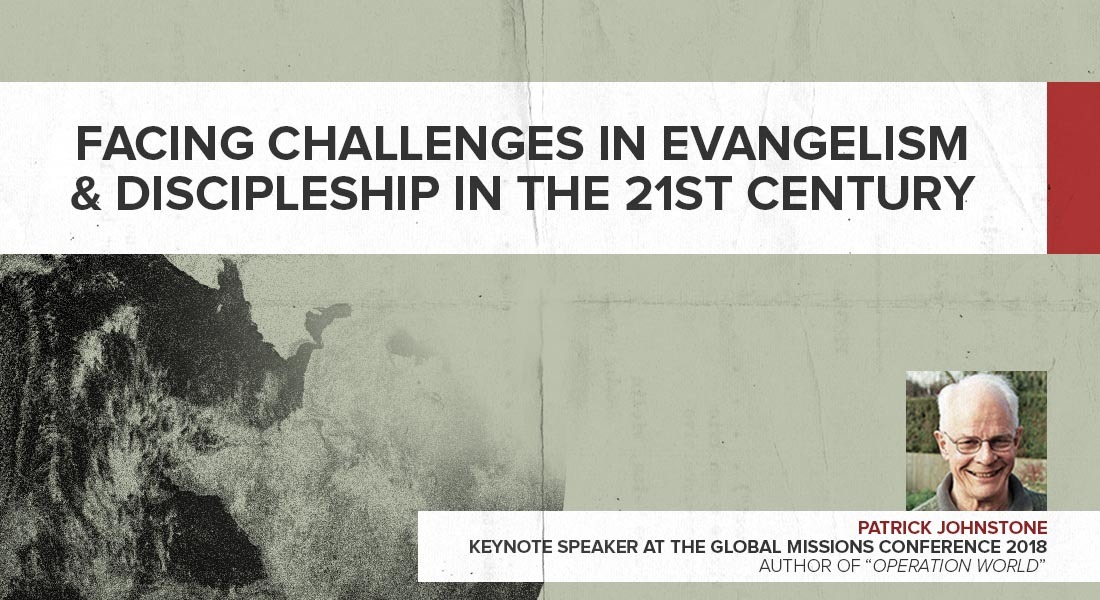
Patrick Johnstone, author of Operation World, will be our keynote speaker for the 2018 Global Missions Conference, happening January 2-5. Registration for the conference is still available!
How will future historians write about the first decade of the 21st century? I reckon they will comment on the massive tectonic shifts in political alignments, economic upheaval, ideological failures, global connectivity, etc. of that decade.
Consider the following:
1. Christianity has become global and indigenous for the first time in history. We have had the greatest ingathering of people into God’s Kingdom ever known. This peaked in the 1990s. I look back over the past 50 years with amazement at all the answers to prayer for Kingdom growth! Most Christians have not realized this was happening because we are too focused on the bad news and the general spiritual decline in the West.
2. There were major breakthroughs in Africa from the 1960s, Latin America in the 1970s, East Asia in the 1980s, the former Communist World in the 1990s, and in some Muslim nations in the 2000s (especially Iran and Algeria).
3. In 1960 there were possibly 43 countries with no known indigenous group of worshiping believers. Now there are less than eight – most very small.
4. The center of gravity of evangelical Christianity has moved from the West to the non-West.In 1960 only 20% of Evangelicals were in the non-Western world; by 2010 this had become over 60%.
5. A global mobilization of missionaries from nearly every country to every country.
The Present Changes
The first decade of this millennium was a time of pivotal change:
• 2000 – The publication of the first full list of the world’s peoples and languages (The World Christian Database, Joshua Project)
• 2001 – “911” and Jihadist Islam’s war on other forms of Islam and also the West is generating massive flows of refugees, a developing Sunni-Shia “Middle East War” leading to a huge disillusionment among Muslims.
• 2003 – The Allied invasion of Iraq with all its strategic mistakes and cultural blunders –marks the beginning of the gradual loss of Western dominance morally, economically and in politics.
• 2005 – Missionaries from Asia, Africa and Latin America became more numerous than those from the West
• 2007 – The year when the majority of the world’s population became urban rather than rural. This will result in 90% of the world’s population in 2100 being city dwellers.
All these are related and deeply impact the way we need to function as missionaries.
The Future Challenges
These developments will mean massive re-thinks of our strategy in:
1. Urban ministry
For years we have focused on the least evangelized people groups in the world. Such unengaged groups today are few and small. During the 21st century the number of languages that will become extinct is estimated to be over 2,000 of the 6,500 spoken today. Children will speak the main languages of the cities. We have to do missions in a different way – mainly through intense, intentional discipling of future leaders. Cities will increasingly be the focus of our ministry.
2. Hostile governments
The decline of Western influence has accelerated. Many Muslim lands ignore the UN Human Rights and religious freedom promises to which they signed up. Since 2015 the governments of China, Russia, India, Nepal, Myanmar (over half the world’s population) have passed legislation limiting or banning evangelism and conversion because they know they will not be challenged by the West or the UN. Persecution of Christians has become widespread – how do we function as a mission force in such a world?
3. Islam
How do we disciple the millions disillusioned with Islam? I reckon that in 1960 there were less than 60,000 believers in the world who had once been Muslim. By 2015 this had risen to probably 10 million. In my home church in England, we are baptizing former Muslims every month – mainly Iranians, Afghans and Kurds.
4. Multicultural teams
How can mission teams from multiple countries work effectively without slowing down the work to cope with our cultural differences? We can only do this by taking our cultural identity to the cross and embracing a biblical Kingdom culture!
Are we ready for these challenges; there is still lots we have to do to evangelize and disciple the 21st century world!






